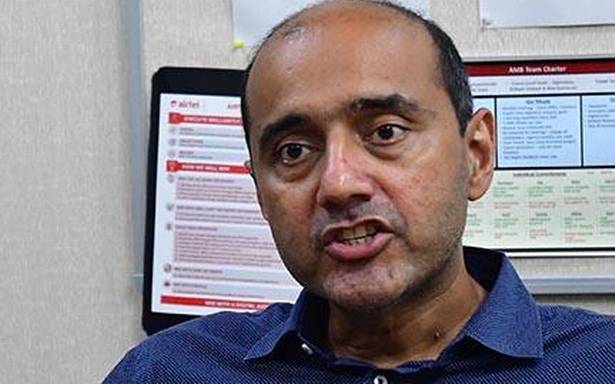Gopal Vittal said that in the immediate short-term much will depend on the pace of regulator’s consultation and the actual timing of the auction.
The seminal reforms announced by the government for the telecom sector will help preserve cash flows and enable the industry to drive investments, Airtel CEO Gopal Vittal said on Wednesday.
Mr. Vittal, who was speaking at Airtel’s Q2 earnings call, said that while over the next 3-4 years, 5G will be present on ubiquitous basis in most key cities, in the immediate short-term much will depend on the pace of regulator’s consultation and the actual timing of the auction.
Nokia claims top 5G speed of 9.85 Gbps on Vi network during trial
“As you are aware, the government announced seminal reforms that will help preserve cash flows and enable the industry to drive investments. There have also been substantial steps taken to simplify the way we do business by cutting back on several needless approvals and easing the customer on-boarding processes,” he noted.
To a question on deferment of payments, Mr. Vittal explained that upon opting for the moratorium (as Bharti has), the interest payable on moratorium is converted to a net present value (NPV), with 1-2 choices.
“One, is to defer the payout at the end of the four-year period or to actually pay it every year in the anniversary period that comes in, or to convert into equity. All options are still open,” he said.
The decision on converting to equity has to be taken in January but the other two decisions are calls that can be taken every year. The company will continue to be fiscally prudent and ensure that business continues to invest in areas of massive growth such as broadband, data centres, enterprise business, digital assets and rolling out of 5G networks.
To a question on timelines for 5G rollout, Mr. Vittal said the industry has urged telecom regulator to look at all spectrum bands.
“You need to look at all spectrum bands to see what is the totality of spectrum that will be available in India…much of it is sitting with defence so that has to be unlocked, to make sure that we are able to, as operators, understand what should our spectrum strategy be,” he said.
The 700 MHz band spectrum was “very high priced” and saw “three failed auctions” and those need to get “substantially moderated in terms of price”, he said.
“Then there is 3.5 GHz where a lot of spectrum is lying with defence, how much spectrum is going to be available is another question and, of course, there is mmwave (millimetre wave) band…so all of this spectrum will have to be put on the block and I don’t know whether that can happen soon,” Mr. Vittal said.
These deliberations could take some time, Mr. Vittal said adding “but we will wait and see when that consultation gets concluded, then it comes to DoT (Department of Telecom) and then, of course, spectrum will be put on the block”.
The company continues to believe that the mobile industry ARPUs (Average Revenue Per User) are not sustainable and should improve to ₹200 in the near term, and ₹300 in the long-term.
Airtel on Tuesday reported a net profit of ₹1,134 crore for the September 2021 quarter and said it is witnessing strong business momentum with growth in 4G customers and increase in mobile ARPU.
This is against a loss (attributable to owners of the parent) of ₹763.2 crore during the year-ago quarter.
The Q2 numbers were bolstered by an exceptional gain (after tax) of ₹540.4 crore. Bharti Airtel in August announced the closure of an agreement with Reliance Jio Infocomm to transfer the ‘Right to Use’ of its 800-MHz spectrum in three circles to Jio.
Airtel’s consolidated revenues for the second quarter of FY21 stood at ₹28,326.4 crore, up 18.8% year-on-year (on a comparable basis) and 13% y-o-y on a reported basis.
Source: Read Full Article
